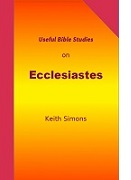Useful Bible Studies > Ecclesiastes Commentary > chapter 7
The best gift for your children
Ecclesiastes 7:11-12
If you love your children, then of course you want to provide for them. And you hope that your gift will continue to benefit them long after your own death.
Most people try to save some money for that reason. But they worry about it.
They hope that their children will use the gift wisely. If they do, then the money can protect them from many troubles. It can support them when their lives are difficult. And it can offer real benefits to them.
But everyone realises that a gift of money can actually cause many problems. Often, the children waste the money, or someone else takes the money from them. And then the gift has failed to achieve its purpose.
There is another kind of gift that a wise parent can give to his child. Even the poorest parent can afford to give this gift. If the child accepts this gift, then it will certainly benefit him. And it will continue to benefit him for his whole life. This gift is the gift of wisdom (see Proverbs 8:10-11).
A parent gives this gift when he teaches his child to be wise. The parent must teach the child how to make right decisions, and how to behave in a proper manner. But especially, he must teach the child how to respect and to serve God (Proverbs 3:5-6). All true wisdom comes from him (Job 28:28; Proverbs 2:5-6).
People who love this kind of wisdom receive life. That is, the best kind of life (Proverbs 3:17-18). Like money, their wisdom can protect them from dangers, but wisdom does much more wonderful things than that. Godís wisdom gives people a right relationship both with God and with other people. Then people are content in their lives, and their lives are worthwhile.
Next part: Why we need troubles (Ecclesiastes 7:13-14)
 Please use the links at the top of the page to find our other articles in this series. If you find these articles useful, you will like our book, available from Amazon.
Please use the links at the top of the page to find our other articles in this series. If you find these articles useful, you will like our book, available from Amazon.
You can download our articles on several Bible books, free, from our download page (including our free 1000+ page course book).
© 2019, Keith Simons.